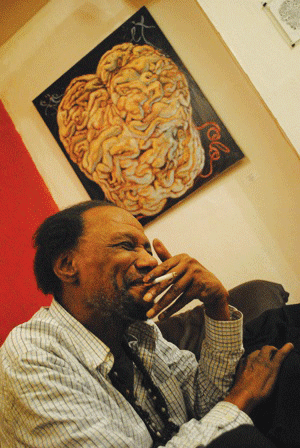
BY SARAH FERGUSON | Last week, the Howl! Festival announced that it had selected blind poet and playwright Steve Cannon to be 2014’s poet laureate of the Lower East Side. But the news of this latest feather in Cannon’s cap is bittersweet, because he and his iconic E. Third St. gallery/performance salon, A Gathering of the Tribes, are now on the verge of losing their home.
According to the terms of a legal settlement with his landlord, Lorraine Zhang, both Cannon and Tribes — which has operated out of Cannon’s second-floor apartment since 1991 — have to get out by April 15.
While the 78-year-old Cannon has been battling to stave off eviction for the past three years, news of the finality of this legal agreement came as a shock to many of his supporters.
“It’s the deathknell of a generation. It’s the end of the free spirit of the anarcho-artist of the Lower East Side,” charged Bowery Poetry Club founder Bob Holman, who is on the board of Howl! “The era of the poets crashing on couches has been taken over by Airbnb. Tribes is the last holdout for the gallery/performance crash pad,” Holman opined.
But though he may have lost his legal fight with Zhang, Cannon says he’s not ready to quit holding out just yet. In a letter last month to supporters, Cannon once again pitched the idea of finding a “benevolent donor” to buy back the four-story row house at 285 E. Third St. and help convert it into an artists’ residence.
As the letter notes, Zhang, who purchased the property from Cannon for $950,000, is looking for a buyer — the property is currently listed online at $3.35 million.
“It would be a tragedy to lose our space in spite of such ongoing recognition of the services we provide as an arts incubator on the Lower East Side,” reads the Feb. 19 appeal. “We are one of last places left that nurtures young aspiring artists in all disciplines. Please help, or help pass the word. SAVE TRIBES!”
Among Tribes fans, there’s now talk of a Kickstarter campaign to muster funds, or even a last-ditch occupation to “fill the place with bodies” and so pre-empt the marshals from carrying off the blind professor (along with his myriad books and poetry zines).
“People should contact Steve, go by his house, the door is always open,” urges Holman.
It’s all pretty 11th hour, which is why Cannon concedes he’s simultaneously looking for another apartment in the neighborhood where he might continue some scaled-down version of Tribes.
“I could keep the Web site and publish a few poetry books a year,” he said. “That’s the backup plan. But, really, my hope is to find a way to stay here,” Cannon added, sunk into his living room couch where he has held court for decades.
Zhang declined to comment and referred all questions to her attorney, Steven Gee.
“We intend to enforce the litigation,” Gee told The Villager. “I hope he can relocate his organization. He should have been looking for a long period of time. There’s been plenty of notice.”
Cannon first purchased the crumbling row house back in 1970 for $35,000, using the royalties from his first novel, “Groove Bang and Jive Around.” In 1989, after his failing eyesight forced him to quit teaching at Medgar Evers College, Cannon began informally schooling young poets and writers on the stoop of his building, located just a block away from the Nuyorican Poets Cafe, and catty-corner to the old Living Theater.
That stoop workshop became the genesis for Tribes, which morphed into a literary magazine, art gallery, poetry salon, periodic performance venue and perpetual hangout.
Over the years, Tribes has received funding from the New York State Council of the Arts, the city’s Department of Cultural Affairs, the Andy Warhol Foundation and an abundance of private donors. In 2007, Mayor Bloomberg even issued a proclamation honoring Tribes for its role in hosting the East Village’s annual Charlie Parker Festival.
Nevertheless, Cannon fell into debt trying to sustain Tribes and maintain the dilapidated building. (A fire in 1990 had gutted the top floors, and Cannon’s former partner ran off with the insurance money, he claims.) Frustrated with trying to play landlord as a blind man, Cannon sold the building to Zhang in 2004, with an agreement that he be able to continue living there, and holding “non-for-profit” [sic] arts activities in his apartment and the back garden for another 10 years.
Cannon concedes it was a bad move to set a time limit on his and Tribes’ occupancy.
“I was just looking for a good person to run the building,” he explained. “I thought I would let her take over the building and I would just stay here, that’s all.”
The initial agreement allowed him to remain for five years at a rent of $1,000 per month, with the option to renew for another five years at $2,200 per month. So, even if he didn’t get into a court battle with Zhang, legally he only had the right to remain in his apartment until August 31, 2014.
Cannon says he realized he was in trouble in early 2011, when he found out that Zhang had listed the building for sale. Later that year, Zhang moved to evict Cannon, alleging that Cannon had never given proper notice of his intent to renew the second five-year term of his possession agreement, and that Tribes’ late-night gatherings were disturbing other tenants and neighbors.
Zhang also charged that Cannon’s use of his apartment for Tribes was illegal, citing a 2006 violation issued by the Department of Building, which claimed Cannon had converted his apartment into an “office and art gallery.” In fact, according to the city’s zoning laws, it’s legal to have a noncommercial arts space in one’s home under the so-called “home occupation” provision, as long that use does not exceed more than 500 square feet. (Whether the foot traffic or noise generated by Tribes’ at-times boisterous happenings would be permitted under that statute was never determined in court.)
Faced with a trial and the possibility of having to pay Zhang’s legal costs if he lost, Cannon’s attorney recommended he settle the case. Last year, Cannon agreed he and Tribes would leave by May 30, 2014. But the date got whittled back to April 15 after Zhang moved to take Cannon to court again for allegedly exceeding the number of public events allowed under the stipulation.
Zhang and her attorney declined to comment on the specifics of the case.
“The pleadings speak for themselves,” Gee told the Villager.
Indeed, Gee seemed exasperated by the continued uproar over Cannon’s loss of the space.
“He wasn’t supposed to occupy forever,” Gee pointed out. “There was an agreement all along that he would have to move out. Now we’re at the end of the agreement, it’s not fair for Mr. Cannon to say it’s unfair.
“If this case had gone to trial, he would have faced a shorter time. I don’t understand why now it’s such a big affair,” Gee added.
For his part, Cannon says he regrets not taking the case to trial to present his side of the story. He claims that Zhang’s real motive for getting him out is financial. He says Zhang got into hot water after she subdivided the building’s other three floors and began renting out the rooms to students and tourists. In 2009, she was cited by the Department of Buildings for operating a “transient hostel.”
“She put 33 beds in two small apartments,” charged poet Chavissa Woods, who was living in Cannon’s back room at the time. “There were dozens of people moving in and out at all hours, and then the place got infested with bed bugs. Steve was covered in bites, and the neighbors were complaining,” Wood claimed.
Gee declined to comment on any of these allegations.
The Buildings Department slapped Zhang with fines and issued a vacate order for the subdivided floors, leaving Cannon the only rent payer while Zhang worked to restore the other apartments to single-family residences.
City property records show Zhang has accrued substantial debt on the property.
Still, Cannon probably didn’t help his case by allowing young artists to continue to stage exuberant performances on both weeknights and weekends, some of which carried on into the wee hours. One neighbor forwarded a video she shot in 2011 from her back window showing a stripper flogging herself in the backyard while audience members seated on risers in the backyard hooted and hollered. Earlier this month, Cannon confessed he’d just let a group host a “Chinese punk art show” in his living room.
“It was funny as all hell,” he quipped.
In spite of such unorthodoxies, Cannon’s downstairs neighbor told The Villager he didnʼt mind having Cannon and Tribes there.
“I can’t begrudge a blind guy for doing something interesting with his life,” said the resident, who asked not to be named. Similarly, the neighbor who sent the newspaper the video said the noise problems had subsided two years ago, and even offered to write a letter in support of Tribes.
According to supporters, the real problem is that Tribes’ freewheeling existence clashes with the now-gentrified norms of the far East Village.
“Maybe we don’t really have a great legal defense, but what we have is an artistic, and very human defense,” Woods insisted. “Steve is preserving what’s been happening down here since the ’70s, ’80s and ’90s, and now people are complaining about that. When people say we’re crazy, well, O.K., but that’s what made this neighborhood so valuable in the first place.”




































